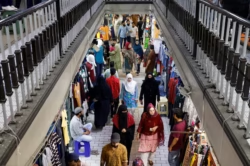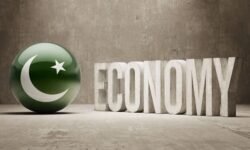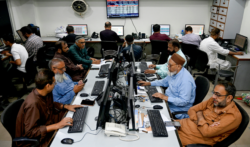THE YEAR 2024 MARKS PAKISTAN’S ECONOMIC TURNAROUND MOMENT

04 April 2024
As the global community commenced the New Year, 57% of Pakistanis expressed optimism regarding the country’s economic progress over the subsequent decade. According to a Gallup survey conducted in 2024, six out of ten Pakistanis are optimistic about the country’s prosperous future and believe it will make significant economic progress within a decade.
Furthermore, according to the Gallup Business Confidence Index Report 2023, business proprietors exhibit a positive outlook, with 61% expressing optimistic anticipations regarding business prospects in Pakistan. Resultantly, there is a 42% enhancement in the net prospective business confidence score.
These improved sentiments can be attributed to several underlying factors, such as the current momentum observed in other indicators like the stock exchange index, the improvement in the current account deficit, the positive outcomes of IMF loan tranches, and the relative consistency in policy, particularly regarding contraband.
The World Bank in its most recent report, “Global Economic Prospects January 2024,” projected that Pakistan’s economy would expand by 2.4% in FY 2024-25, an encouraging resurgence from the previous fiscal year. The macroeconomic conditions have improved, and an increase in GDP is anticipated for FY24. It is expected that robust monetary policy will result in a reduction of inflation to 18.5% by the conclusion of June 2024.
In 2023, Pakistan experienced a notable 34.29% decrease in trade deficit during the first half of the current fiscal year. Pakistan’s exports to China increased by 66.4% from July to December 2023, hitting $1.546 billion. In the fiscal year 2023-2024, Pakistan exported food commodities worth $700 million to the Gulf and Middle East area. This tendency is projected to persist in 2024.
In December 2023, the State Bank of Pakistan (SBP) reported an increase in gross reserves to $8.2 billion, while the exchange rate exhibited stability. The allocation of approximately $700 million to Pakistan by the IMF Executive Board signifies a favorable assessment of the nation’s economic reform initiative. Antoinette Sayeh, the Deputy Managing Director of the IMF, stresses the importance of “continued strong ownership to sustain momentum in the stabilization of Pakistan’s economy.”
Therefore, the prospective government must engage in negotiations with the IMF regarding the development of a new program. Irrespective of its political affiliation, the new government must place economic considerations above political ones.
Moreover, within the framework of Pakistan’s economic advancement, the SOE reform proposes an emphasis on enhancing the efficacy and restructuring of state-owned enterprises as an integral component of more extensive economic reforms. This may necessitate the privatization of loss-making enterprises by the government.
Undoubtedly, the SIFC and military leadership were crucial in aiding economic recovery by securing IMF loans, resolving supply bottlenecks, lowering interest rates, and maintaining political stability. SIFC has systematically identified critical sectors that possess enormous expansion potential for the economy.
Given its agrarian nature, the agricultural sector presents a tremendous opportunity for revolutionary advancements. Pakistan ranks 10th globally in rice production, 8th in wheat production, and 5th in sugarcane production. Courses in agribusiness, computer technology, the defense industry, mining, and minerals are offered by the SIFC. Debit cards, freelance workstations, and repatriation of foreign capital of 50% are the primary forces propelling the IT sector.
The global community has acknowledged the interim government’s praiseworthy efforts in implementing energy pricing reforms, stabilizing the budget, and suppressing the illicit market. By effectively reducing the disparity between parallel and interbank exchange rates, these policies have facilitated a greater inflow of foreign currency into the banking system.
It is crucial to note that the backing of the international community for Pakistan’s current economic initiatives strengthens the ongoing economic reforms that have guided the country along a trajectory of steady growth across various economic sectors and industries. The favorable evaluations and monetary assistance provided by Fitch Ratings and the IMF function as indicators of progress in the economic domain of Pakistan.
The economic progress of Pakistan stands to benefit substantially from the adoption of the SIFC; therefore, it is imperative that the forthcoming administration places a high priority on and actively advocates for this endeavor. However, it is crucial to recognize that influential stakeholders may attempt to impede crucial policy changes, thereby exposing the nation to significant macroeconomic risks.
In light of the recent pronouncements from esteemed organizations such as the World Bank, Fitch Ratings, and IMF, the imperative to safeguard Pakistan’s economic stability is effectively implemented and policies must remain consistent. To ensure the long-term economic prosperity of the nation, the SIFC must be safeguarded and advanced in light of its national significance.
The Pakistani economy’s restructuring requires the preservation of these solid policies. If the new government effectively enforces these policies, the country will thrive. The concern over a potential drop in global ratings highlights the importance for the prospective government to maintain current reforms and align its policies with its existing accomplishments. The positive outcomes and collaborative endeavors have substantially enhanced the economic confidence of Pakistan. By implementing strategic reforms, strengthening fiscal positions, and making accurate projections, the nation is poised to experience a profound economic turnaround. Surveys, business sentiments, and international evaluations all reflect an increasing degree of optimism regarding Pakistan’s capacity to achieve long-term growth and prosperity. With ongoing emphasis from stakeholders on stability, reforms, and international cooperation, Pakistan is positioned to capitalize on its progress and establish a trajectory of sustainable economic resilience and achievement.





